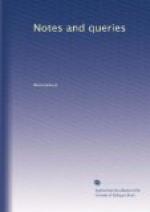“Forsan ipsius auctoris autographus Codex hic MS. qui fuit percelebris Bibliopolae Basiliensis Coelii Horatii Curionis. Videtur prima conceptio (vulgo l’Esquisse, en termes de Peinture) Libri valde famigerati Mich. Serveti, a Joanne Calvino cum ipso Serveto combusti, cui Titulus, Christianismi Restitutio, hoc est totius Ecclesiae Apostolicae ad sua limina Vocatio, &c. &c., typis mandati anno 1554, Viennae Allobrogum, 8vo. pagg. 734,” concluding with an anecdote of the rarity of the volume.
There may be some to whom these “Notes” may be of use, others to whom a reply to the “Queries” may have interest, and so I send them to you. Such MSS. are of great historical importance.
S.H.
Athenaeum, July 26.
* * * * *
ETYMOLOGICAL QUERIES.
Any remarks on the meaning and derivation of the following words, will be thankfully received.
Rykelot.—A magpie?
Berebarde.—“In the fever or the Berebarde.”
Wrusum, or Wursum.—“My wounds that were healed gather new wrusum, and begin to corrupt.”
Deale.—Placed always between two sentences without any apparent connection with either of them. Is it an abbreviation of “Dieu le sait?”
Sabraz.—“He drinks bitter sabraz to recover his health.”
Heteneste.—“Inclosed hetenest in a stone coffin or tomb.”
Schunche.—“Schunche away.”
I-menbred.—“A girdle i-menbred.”
Blodbendes of silk.
Hesmel.—“Let their hesmel be high istiled, al without broach.”
Irspille.—“Wear no iron, nor haircloth, nor irspilles felles.”
J. Mn.
* * * * *
MINOR QUERIES
Countess of Desmond.—I should be much obliged if any of your readers would inform me of the manner of the death of Catherine Fitzgerald, Countess of Desmond, commonly called the “old Countess of Desmond,” who died in 1626, aged above 140 years,—some say, 162 years. I think I remember reading, some years since, that she died from a fall from a cherry-tree, at the age of 144 years. If so, where can the account be found?
K.
Cheetham Hill.
Noli me tangere.—Can any of your readers refer me to pictures upon the subject of Noli me tangere. I want to know what artists have treated the subject, and where their pictures exist.
B.R.
Line in Milton’s “Penseroso."—In those somewhat hacknied lines,
“And may my due feet never fail,” &c.,
I am somewhat puzzled to understand the expression,
“With antique pillars massy proof.”
Now what is “proof,”—a substantive or adjective? If the latter, no edition is rightly stopped; for, of course, there should be a comma after “massy;” and then I somewhat doubt the propriety of “proof” for “proved,” unless joined with another word, as “star-proof,” “rain-proof.”




